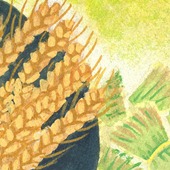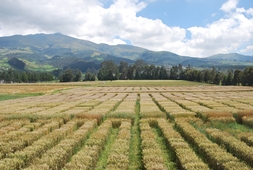Breaking new ground in MARS – GCP launches Challenge Initiative on wheat in Asia
- Sunday, 28 February 2010 21:06
E-booklet version, with downloadable PDF
The Generation Challenge Programme (GCP) of the Consultative Group on International Agricultural Research (CGIAR) officially launched its wheat Research Initiative in late February 2010, first in India then in China. Both meetings were attended by high-ranking scientists, in addition to the research teams working on the project.
 Wheat in Asia is one of the seven Research Initiatives (RIs) that are a key priority for GCP in Phase II of the Programme (2009–2013). The wheat RI is a joint China–India effort led by scientists from both countries, working in close liaison with several GCP partners to breed heat- and drought-tolerant wheat. Some of the aspects of the wheat in Asia RI spring from work done by teams led by Dr Francis Ogbonnaya of the International Center fro Agricultural Reserach in the Dry Areas (ICARDA) and by Dr Peter Langridge of the Australian Centre for Plant Functional Genomics (ACPFG). Dr Ogbonnaya and Dr Langridge attended both meetings. The wheat in Asia RI will benefit from GCP-funded research conducted by ICARDA and ACPFG.
Wheat in Asia is one of the seven Research Initiatives (RIs) that are a key priority for GCP in Phase II of the Programme (2009–2013). The wheat RI is a joint China–India effort led by scientists from both countries, working in close liaison with several GCP partners to breed heat- and drought-tolerant wheat. Some of the aspects of the wheat in Asia RI spring from work done by teams led by Dr Francis Ogbonnaya of the International Center fro Agricultural Reserach in the Dry Areas (ICARDA) and by Dr Peter Langridge of the Australian Centre for Plant Functional Genomics (ACPFG). Dr Ogbonnaya and Dr Langridge attended both meetings. The wheat in Asia RI will benefit from GCP-funded research conducted by ICARDA and ACPFG.
 Dr Richard Trethowan (pictured right), the wheat RI Product Delivery Coordinator, remarked, “Improved water use for drought tolerance is a contemporary and urgent issue. Researchers cannot continue doing things the same old way. I am excited about the possibilities that marker-assisted recurrent selection opens up. Let’s make it work!”
Dr Richard Trethowan (pictured right), the wheat RI Product Delivery Coordinator, remarked, “Improved water use for drought tolerance is a contemporary and urgent issue. Researchers cannot continue doing things the same old way. I am excited about the possibilities that marker-assisted recurrent selection opens up. Let’s make it work!”
The problem...
Drought is a serious concern affecting China’s food production, and is also GCP’s key focus trait. This area of research is very complex and replete with challenges and complications, but drought is undoubtedly the number one trait in international agricultural research today. Six of the seven GCP Research Initiatives in Phase II are on drought, including this one on wheat. Experts are agreed that India is an extremely water-stressed country, with the water table falling at an alarming rate. In North Gujarat alone for example, it is reported to be dropping by as much as six meters per year. And in all cases, this severe groundwater depletion has largely been attributed to agricultural use, and not to climatic conditions or climate change. This situation harbours great potential to cause much human suffering and even social chaos and anarchy. At current consumption rates, the projection is that by 2025, India will be in a deep water crisis.
...and some solutions to come
The five-year RI aims to assemble and integrate into breeding programmes wheat strains and genes that offer efficient water use and enhanced heat tolerance. Many of these genetic materials will be multiplied at – and provided by – the International Maize and Wheat Improvement Center (CIMMYT, by its Spanish acronym), while the Plant Breeding Institute of the University of Sydney, Australia, will provide technical assistance and germplasm. Precise phenotypic data underpin genotyping and much of the breeding process. Characterisation of target experimental sites will be essential to meaningfully and fully interpret data, while staff training in standardised phenotyping protocols (for measuring drought- and heat-adaptive traits) will facilitate precise characterisation in all environments, as well as enhance staff capacity.
Although marker-assisted recurrent selection (MARS) has vastly improved efficiency in the private sector, MARS has not been widely used in public-sector research, which makes this RI a groundbreaker in the public sector.
 Capacity building and maximising impact
Capacity building and maximising impact
In both countries, the project will result in 15–20 wheat lines with superior drought and heat tolerance, and adapted to each country’s conditions. These lines will be developed using molecular markers. In both India and China, four to six postgraduate students and 20 scientists will be trained in phenotyping methodologies. In addition, up to three postgraduate students (MSc or PhD) from both countries will be trained in Australia. To maximise mutual learning and ensure synergies, exchange visits between key Chinese and Indian researchers are also planned, as well as visits to CIMMYT (Mexico) and to the Plant Breeding Institute (Australia). Projects for postgraduate students will focus on the physiological and genetic dissection of stress responses in the materials developed through marker-assisted breeding, while researcher exchange visits to partner countries will be at the most critical stage of the crop cycle in the host country.
In each country, 3–5 traits and 5–8 quantitative trait loci (QTLs) will be recommended for wheat breeding. For India, an additional target is four wheat mega-varieties with improved water-use efficiency and higher heat tolerance. These super-varieties have the potential of covering about 24 million hectares and minimising yield loss from heat, or drought, or both, by up to 20–50 percent.
To facilitate achieving these goals, GCP is taking a highly structured approach, through comprehensive project delivery plans formulated by project teams with guidance from Dr Larry Butler, GCP’s Product Delivery Leader, and also through project-specific breeding schemes jointly designed with Dr Xavier Delannay, Leader of GCP’s Integrated crop breeding Theme. This structured approach aims at not only ensuring delivery but also long-term and sustained impact beyond the project horizon.
For more information, see:


